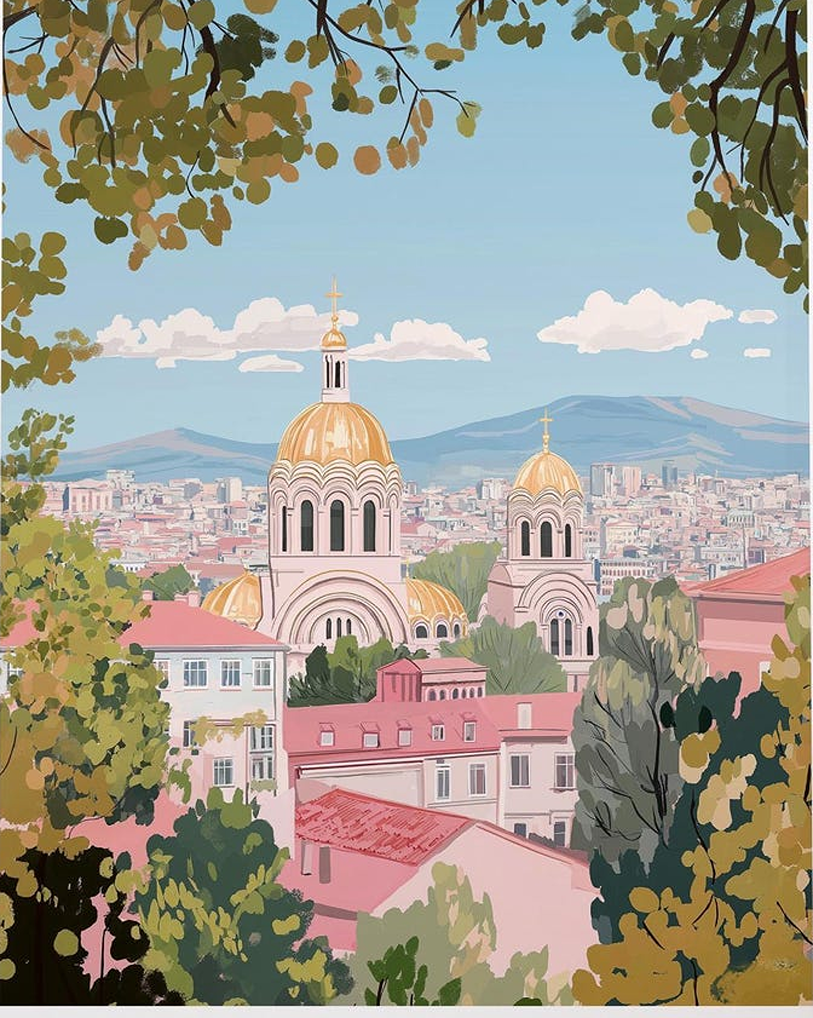
Sometimes, the best ideas come from looking beyond our own borders. Bulgaria may not be the first country that springs to mind, but its rich nature, strong food traditions, and close-knit communities have plenty to offer. With its forests, lively markets, and friendly neighbourhoods, Bulgaria shows what’s possible when people connect with their surroundings.
This post highlights how England can benefit from Bulgaria’s practical wisdom. By learning from Bulgarian ways of living, eating, and caring for the land, England could build a healthier, greener, and more connected society.
Bulgaria’s Biodiversity: A Natural Treasure
Bulgaria is home to an impressive range of wildlife, plants, and ecosystems. From the vast Rhodope Mountains to the Black Sea coast, its landscapes offer habitats to thousands of species. This variety is partly because Bulgaria’s climate and terrain create different living conditions close together, supporting animals and plants that can’t be found elsewhere.
What’s more, Bulgaria protects large areas of forest and nature reserves. These zones act like safe havens, where native flora and fauna thrive without much human disturbance. England’s more fragmented green spaces could learn from these contiguous protected areas to help species flourish now and in the future.
Guarding Wildlife: More Than Just Preservation
In Bulgaria, conservation isn’t just about keeping green spaces on a map. There’s a strong focus on protecting specific animal populations that play important roles in local ecosystems. For example, species like wild boar, deer, and red fox are closely monitored and supported. Managing hunting and protecting habitats help maintain balanced populations, which keeps forests and fields healthy.
This approach to wildlife management shows a respect for natural cycles and the idea that animals are part of the landscape, not separate from it. England might take more active steps to balance wildlife numbers and ensure native species have plenty of space to live.
Butterflies: Fragile Gems of Bulgarian Nature

Butterflies get special attention in Bulgaria, reflecting a broader effort to safeguard even the smallest parts of biodiversity. Many butterfly species are sensitive to changes in their environment, making them good indicators of ecosystem health. Bulgaria’s work to protect these insects goes hand in hand with preserving wildflower meadows and natural habitats that much wildlife depends on.
This focus on butterflies highlights a key conservation lesson. Protecting delicate species supports the entire web of life, from soil health to pollination. England could strengthen its own conservation strategies by adopting more butterfly-friendly practices, particularly on the edges of urban areas where development often threatens wild spaces.
Read our post on creating more butterfly-friendly habitats.
What England Can Learn from Bulgaria’s Conservation Model
Bulgaria’s efforts offer practical lessons, especially for rural areas and urban fringes where biodiversity often struggles. Here are some key takeaways:
- Create and maintain large, connected protected areas to support species that need space to roam.
- Balance wildlife populations thoughtfully, recognising their role in natural ecosystems rather than seeing them as separate or inconvenient.
- Focus on protecting indicator species like butterflies to improve overall habitat quality.
- Include local communities in conservation efforts, building a shared sense of responsibility for nature.
England has many beautiful landscapes, but it still faces pressure from urban growth and farming practices. Adopting Bulgaria’s hands-on, nature-integrated approach could help protect wildlife more effectively and make green spaces more vibrant and diverse.
In short, Bulgaria’s way shows that protecting biodiversity works best when it respects the whole ecosystem and involves people who live close to nature. England can benefit from this example by ramping up its efforts, starting with better supporting animals, plants, and wild areas on the doorstep.
Eating Habits and Lifestyle Choices
When it comes to healthy living, Bulgarians have some simple yet effective habits that help keep their bodies and minds in good shape. Their eating habits and lifestyle choices often centre around fresh, seasonal foods and a connection to community traditions. England could gain a lot by taking a closer look at these practices, especially given the rise in lifestyle health issues at home.
Fresh, Seasonal Produce at the Heart of the Bulgarian Diet
Bulgarians put fresh, local ingredients first. Their meals often revolve around vibrant salads full of tomatoes, cucumbers, peppers, and herbs like parsley and dill. This focus on fresh produce means fibre, vitamins, and minerals come naturally into their diets, supporting good digestion and stronger immunity.
In contrast, many English meals tend to include more processed foods with less emphasis on fresh vegetables throughout the day. While salads are common, they rarely take centre stage as they do in Bulgaria. Bringing more fresh, seasonal veg to every meal could give England a nutritional boost.
A More Plant-Based Approach with Less Meat
Bulgarians do eat meat, but it is usually a smaller part of the meal rather than the main focus. Meat dishes tend to be occasional or moderate, balanced with plenty of beans, grains, and vegetable dishes. This lighter meat intake is linked to better heart health and lower risks of chronic diseases.
In England, meat often dominates the plate, and processed meats are more common. Adjusting portion sizes and including more plant-based options could improve people’s health while still keeping meals satisfying and full of flavour.
How Food and Tradition Connect People
Eating in Bulgaria is often more than just fuel. Meals are social occasions, bringing family and neighbours together. Traditional dishes are usually simple, homemade, and shared, encouraging slower eating and conversation. This approach supports mental wellbeing and reduces stress.
England tends to have a faster eating culture, with busy lifestyles leaving less time for shared meals. Reintroducing the joy of communal eating and traditional recipes could strengthen social ties and promote healthier habits.
Lifestyle Choices That Complement Diet
Alongside their eating habits, Bulgarians often lead active, outdoor lifestyles. Walking, gardening and spending time in nature are daily habits linked to their rural roots. This balance between food and movement helps maintain a healthy weight and mood.
English life can sometimes lean towards inactivity, especially in urban areas. Embracing Bulgaria’s mix of fresh food, slower meals, and physical activity could inspire healthier living habits that don’t require complicated routines or expensive products.
What England Could Take On Board
- Eat more fresh, local vegetables daily, focusing on seasonal produce.
- Reduce meat portions, adding more beans, grains, and vegetable dishes.
- Make meals a social event, creating regular opportunities to eat together.
- Encourage gentle physical activity like daily walks or gardening.
- Choose homemade, simple recipes over highly processed foods.
By adopting these modest changes inspired by Bulgarian habits, England could see improvements in both physical health and community wellbeing. The Bulgarian way shows that healthy living does not mean drastic steps; it’s about thoughtful choices that fit naturally into life.
Cultural Traditions and Community
Bulgaria’s strength lies not only in its natural beauty or food but also in the close bonds formed through shared traditions and community life. The fabric of Bulgarian society is tightly woven with cultural customs and celebrations that bring people together, fostering a sense of belonging and mutual support. These traditions play a key role in maintaining social harmony, offering lessons England could take on board as it faces its own challenges with community cohesion.
The Role of Eastern Orthodox Religion in Everyday Life
Eastern Orthodox Christianity shapes much of Bulgaria’s culture, influencing both daily routines and major celebrations. Unlike in England, where religious practice varies widely and attendance is often low, Bulgarian life is closely linked to the church calendar. Important festivals like Easter and Christmas mark moments of deep community gathering and collective celebration.
These occasions are not just religious events but social glue, where churches become centres for meeting friends, family, and neighbours. The faith encourages traditions that promote kindness, charity, and respect for others, values that strengthen community ties naturally. This constant rhythm of shared faith and ritual gives many Bulgarians a strong sense of identity connected to both their beliefs and their local community.
Festivals and Traditions That Unite People
Bulgaria’s calendar is packed with festivals that offer more than entertainment; they act as regular reminders of common heritage and togetherness. Events like Baba Marta Day, where people exchange red and white woven bracelets to welcome spring, bring people across ages and backgrounds into a shared experience.
Other traditions, such as Kukeri—where people dress in elaborate costumes and perform dances to scare away evil spirits—help preserve local folklore while providing occasions for communities to gather and celebrate. These events encourage active participation, not just observation, making everyone feel part of something larger.
By contrast, many English communities struggle to engage people regularly through local events. While England has festivals, they often feel less connected to everyday social life or traditional values. Bulgarian festivals, by rooting celebration in custom and shared values, sustain a more continuous sense of belonging.
Shared Values That Build Trust and Support
Strong communities rely on trust and shared understanding, and in Bulgaria, these come from an emphasis on hospitality, respect for elders, and collective responsibility. Neighbours often help each other without formal systems or arrangements, making social support informal yet dependable.
This contrasts with England, where social networks can be weaker and people sometimes feel isolated even in busy towns. The more individualistic culture, along with urban lifestyles, can make it harder to build the kind of natural, everyday support that Bulgarians experience through their traditions.
What England Can Learn About Social Cohesion
Bulgaria offers a clear example of how culture and community traditions can build social ties that hold people together. England might boost cohesion by:
- Encouraging local festivals with meaningful traditions that bring diverse groups together regularly.
- Supporting faith and cultural institutions as hubs for community life, even beyond religious practice.
- Promoting shared values like neighbourliness and mutual aid as part of everyday living.
- Building informal support networks, making it easier for people to connect and help one another.
Reinforcing these practices can create a stronger sense of unity, helping people feel less isolated and more linked to their communities. It is not about copying Bulgaria but recognising how sustaining culture creates a natural, ongoing web of support that benefits everyone.
Increased community connectedness in England could grow from simple, regular acts and celebrations that remind people they belong and matter. Bulgaria’s example shows that social cohesion blossoms best where tradition meets everyday life, with people playing an active role in keeping the spirit of togetherness alive.
Geographical Advantages: Making the Most of Nature
Bulgaria’s geography is a true asset. Its diverse landscape, from rivers and mountains to a long coastline, shapes how people live, work, and enjoy the outdoors. The country makes the most of these natural features not just for tourism but also for everyday recreation and local life. England can learn a lot from Bulgaria’s approach to blending natural beauty with accessible leisure activities and sustainable tourism.
The Danube River: A Lifeline for Communities and Visitors
The Danube River forms Bulgaria’s northern border and acts as a vital natural corridor. Locals benefit from fishing, boating, and riverside parks, which make the river a shared resource, not just a boundary. Towns and villages along the Danube often embrace the river as a centrepiece for festivals, markets, and family outings.
This kind of everyday connection to a major natural feature encourages people to care for it and see its value beyond commerce or industry. England could improve its own riverfront areas by creating more accessible paths, picnic spots, and community events that help people enjoy and protect river environments.
The Black Sea Coast: Balancing Nature and Tourism
Bulgaria’s Black Sea coast runs for over 370 kilometres, offering sandy beaches, resorts, and nature reserves. Unlike some overdeveloped tourist spots, Bulgaria balances popular beaches with protected areas where native plants and animals thrive.
Many Bulgarians from nearby cities visit the coast for weekend breaks, making it both a local and international destination. This access to nature alongside well-managed tourism shows how spending time outdoors can be part of a healthy lifestyle.
England, with its many coastal towns, could improve by supporting protected coastal areas while developing visitor facilities that encourage appreciation rather than exploitation. This would help maintain natural beauty as a draw for visitors and locals alike.
The Balkan Mountains: Nature on the Doorstep
The Balkan Mountains slice through Bulgaria’s heart, providing green spaces close to urban centres like Sofia. Hiking, cycling, and skiing are common ways to enjoy these natural areas year-round.
Bulgaria’s cities often highlight how close they are to the mountains, encouraging residents to take short trips to fresh air and open space. This everyday access helps people feel connected to nature even in busy city life.
In England, many towns and cities are near parks or countryside but often lack easy or promoted access. Expanding paths, public transport options, and clear signage could help more people explore green spaces regularly, bringing benefits to health and wellbeing.
Sofia and Green Spaces: A City That Breathes
Sofia, Bulgaria’s capital, stands out for its proximity to parks, forests, and mountain trails just minutes from the city centre. Residents can easily escape to nature without long trips or expensive travel.
This easy access encourages outdoor exercise, family outings, and community activities in nature throughout the year. It also nurtures a strong environmental awareness among city dwellers, who grow up knowing they belong to a larger ecosystem.
England’s major cities could take inspiration by protecting green belts and expanding urban parks. Making nature part of everyday city life creates places where people want to meet, relax, and play.
Nationwide Accessibility: Nature Outside Your Door
Unlike some countries where natural beauty is hard to reach, Bulgaria works to keep its outdoor spaces accessible across the country. Whether you live near the mountains, the sea, or the plains, you are rarely far from a place to walk, swim, or explore.
This approach makes nature part of everyday wellbeing, not something reserved for holidays or special trips. It also supports local economies by encouraging small-scale eco-tourism and outdoor activities suited to all ages and abilities.
England could learn from this, especially by improving transport links to countryside spots and investing in amenities that welcome visitors without harming the environment.
What England Could Adopt from Bulgaria’s Geographical Advantage
- Prioritise easy access to rivers, coasts, and mountains for everyday use through better transport, paths, and community spaces.
- Balance tourism with nature protection, keeping popular areas healthy and inviting for locals as well as visitors.
- Integrate green spaces closely with urban life, ensuring that all city residents can experience nature moments daily.
- Promote outdoor recreation as part of a healthy lifestyle, supporting walking, cycling, and nature-based activities.
- Develop initiatives that connect communities to their natural surroundings, building local pride and stewardship.
In short, Bulgaria shows that geography is not just about physical features but how people relate to and care for their environment. England can gain much by making nature more visible, reachable, and part of everyday living.
Conclusion
Bulgaria offers clear, practical lessons for England in protecting nature, adopting healthier diets, valuing strong community ties, and making the most of natural surroundings. Its example shows how respecting wildlife, eating fresh and seasonal food, and keeping cultural traditions alive can build a healthier and more connected society.
England can start small by supporting local nature conservation, sharing more meals with family, and creating spaces that encourage outdoor activities. These steps help people feel part of something bigger and improve daily life.
Taking inspiration from Bulgaria’s approach invites us all to think about how to care for the environment and each other, right where we live.






